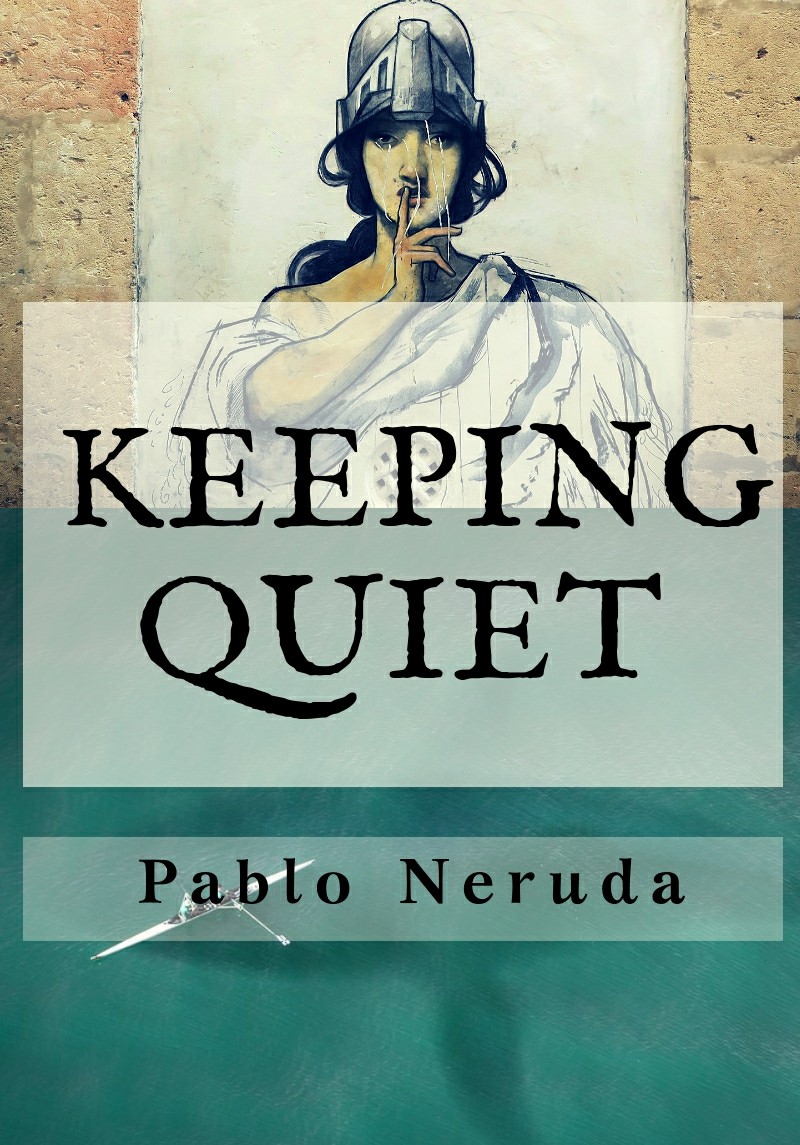
Keeping Quiet Summary
Keeping Quiet is a splendid poem by Pablo Neruda that dwells on a quality which seems to have been lost in the buzz of the 21st century – the quality of silence. In an age which accepts rush in a celebratory gesture, Keeping Quiet is a gentle reminder what life can be like in a brief moment of a silent pause. This message instantly resonates with one in the digital age where “switching off” has become a much-needed lifehack. The theme of quietude and stillness is accompanied with the themes of peace, pacifism, fellowship, solidarity, brotherhood, justice and ecological conservation. To keep quiet is to stay still and understand that one is a thread, woven within the exquisite fabric of the cosmic order. It is to identify oneself with all and in doing so, escape the “sadness of never understanding ourselves“. To keep quiet is to escape the death with which we threaten ourselves and for once, truly and genuinely, live.
Keeping Quiet | SUMMARY AND ANALYSIS
Written in a simple yet elegant language, Keeping Quiet is a free verse poem. Given below is a line by line explanation of Keeping Quiet. It begins with an appeal to keep quiet and stay still at the count of twelve and urges for a complete cessation of words and action:
Keeping Quiet line by line explanation
Keeping Quiet Analysis, Lines 1-2
Now we will count to twelve
and we will all keep still.
At the heart of this poem is inclusivity. The poem seeks to rise above racial and linguistic differences. This attempt towards inclusion is seen in the opening lines of the poem. The speaker employs the collective “we” to begin the exercise of keeping quiet: Now we will count to twelve and we will all keep still. The count till twelve may be interpreted as signifying the twelve-hour mark of the clock from which the two hands circle in a monotonous manner, very much like the daily activities of life.
Keeping Quiet Analysis, Lines 3-6
For once on the face of the Earth
let’s not speak in any language,
let’s stop for one second,
and not move our arms so much.
Noteworthy is the fact that Keeping Quiet is as much about staying silent as it is about staying still which is why the poem advocates for a ceasing of words ( “let’s not speak in any language) and actions ( “let’s not move around so much“) . Language brings differences. The great number of languages on the “face of the Earth” seem to highlight the ways in which we are different from others. The use of the words “any language” suggests that the speaker recognizes the limits of language and envisions a state beyond the domain of language itself – the realm of silence. Keeping Quiet then is also about letting our differences dissipate in the silence of our similarities.
The moving of arms not only harks back to the ceaseless movement of the hands of the clock but also to the gestures of restlessness and aggression which the modern world is obsessed with.
Keeping Quiet Analysis, Lines 7-10
It would be an exotic moment
without rush, without engines,
we would all be together
in a sudden strangeness
One must remember that Extravagaria, the collection of poems in which Keeping Quiet was featured is a later work of Neruda’s and has an overall universal tone. The collection was a product of well garnered experiences and frequent travelling (Neruda served as the Chilean Ambassador in Spain, Mexico and France). This hectic pace of a busy life is what makes silence an ‘exotic moment‘. Like the clock, our lives have become utterly mechanical, dominated by “rush” and “engines“. Notice how the pace of the poem itself is slowed by the use of anaphora in Line number 8 ( ” without rush, without engines” ). Anaphora is a figure of speech in which words repeat at the beginning of successive clauses, phrases, or sentences. The fact that Neruda uses this rhetorical device to slow down the very pace of the free verse precisely when he is imagining a world “without rush” is a poetic masterstroke wherein the form and content fuse into a seamless Unity.
The consequent moment of silence will not only be delightful and rare (exotic moment) but also a ‘strange’ one. This is because we have internalized rush to such an extent that silence, though enjoyable has become unfamiliar to us, for silence has become rare in the modern world. Thus, keeping quiet is one powerful way of escaping the mechanistic motion of the modern life.
Keeping Quiet Analysis, Lines 11-14
Fishermen in the cold sea
would not harm whales
and the man gathering salt
would look at his hurt hands.
In line with his political ideology, Neruda was intensely aware of the exploitative economic structures of the capitalist economy which has exploited man and animals alike. This aspect of his writing is felt in lines 11- 14.
Neruda was painfully aware of the history of exploitative colonial practices used by European settlers in their bid to extract resources from the Americas. He was also equally aware of the exploitative neocolonialist practices carried out in his own times by large (mostly American) corporations. In fact, he has written a poem titled “Standard Oil Company” speaking against the oil drilling practices of corporate giants which posed a great threat to marine life. Neruda was vocal about his support for conservation of marine resources and marine life which is reflected in many of his poems.
Man’s greed not only leads to the exploitation of other creatures but of fellow human beings who are oppressed by the unjust economic system. Neruda strongly sympathized with the working class and very well understood the strong class divisions that had fractured the Chilean society. The sufferings of both the workers in salt mines and sea creatures in the ocean would end if only everybody kept quiet for a moment. The theme of environmental conservation and Social Justice makes its presence strongly felt in these lines.
Keeping Quiet Analysis, Lines 15-21
Those who prepare green wars,
wars with gas, wars with fire,
victory with no survivors,
would put on clean clothes
and walk about with their brothers
in the shade, doing nothing
These lines highlight the devastating consequences of war. It seems that all the troubles in the world, from the plight of the whales to the horrors of war result from someone’s inability to keep quiet. Somebody, in some corner of the world takes an unnecessary action which jeopardizes the fate of everybody else. By writing about those who “prepare wars“, the speaker hints at the manufactured nature of war which is intended to satisfy specific interests of interested parties and devastate the lives of others. The damage done by the conventional, chemical and biological weapons (green wars, wars with gases, with fire) can be stopped only if and when governments and nations teach themselves to keep quiet. Neruda had been a witness to the atrocities committed during the Spanish Civil War under the regime of dictator General Franco. He had seen war in close quarters and very well knew what “victory with no survivors” looked like. Significant is the assassination of the writer and his dear friend Federico García Lorca by the Fascist forces. Neruda had this to say about the Spanish Civil War:
“The war began for me when my friends started disappearing”.
If only we could keep quiet, people waging such wars would put on clean clothes, free of the bloodstains and guilt and would be able to walk hand in hand with the ‘brothers’ in the shade, in silence and in peace.
Keeping Quiet Analysis, Lines 22-26
What I want should not be
confused
with total inactivity.
Life is what it is about;
I want no truck with death.
The poet makes it clear that what he’s advocating shouldn’t confused with total inactivity, for total inactivity means death and he has nothing to do with death. In his own words: I have no truck with death
Keeping Quiet Analysis, Lines 27-34
If we were not so single-minded
about keeping our lives moving,
and for once could do nothing,
perhaps a huge silence
might interrupt this sadness
of never understanding ourselves
and of threatening ourselves with
death.
These are perhaps among the most insightful of lines in the poem where a stark reality of the modern life is highlighted : of being intensely caught up in the web of rush and activity to the extent of not understanding ourselves. It is the tragedy of the modern world where people are too busy to live. If everybody kept quiet for a single moment, a huge silence may interrupt the sadness of being too busy to understand ourselves. Our inability to keep quiet results in our failure to understand ourselves and others.
The monotonous rush of life makes individuals threaten oneself with death and their failure to keep quiet make nations threaten each other with wars. Thus, the silence which results from keeping quiet isn’t only an “exotic one”. It is also an introspective one. It is a soothing silence that can heal the self-inflicted wounds of humanity.
The poem ends on a positive note by saying that perhaps we can learn the importance of keeping quiet from nature :
Perhaps the Earth can teach us
as when everything seems dead
and later proves to be alive.
These lines bring to light a very important fact – that mere movement and rush should not be confused with life. Perhaps this is the mistake we have been committing all our lives. We have confused movement with life. Perhaps this is why we need to keep quiet : to know the difference between mindless movement and meaningful living. Perhaps this realization may help us appreciate life and perhaps this is the reason why the poet helps us remain with this realization before quietly exiting the scene, letting us fully understand, absorb and appreciate what it means to keep quiet :
Now I’ll count up to twelve
and you keep quiet and I will go.
Keeping Quiet | About the author
Born Ricardo Neftalí Bosalto, Pablo Neruda is a formidable Chilean poet who actively influenced the times he was living in through his powerful verse. With a massive impact on Latin American history and literature, his half-a-century of artistic expression resulted in an enormous output spanning thousands of poems and prose work. A deeply sensitive poet with a great faculty for sensory language, Neruda’s oeuvre spans a great number of themes ranging from romance to revolution. Some of his most celebrated works are Twenty Love Poems and a song of Despair, The Heights of Macchu Picchu, Canto General , Extravagaria, One Hundred Love Sonnets and Residence on Earth, to name a few. He served as the Chilean diplomat to a number of countries including Spain, Mexico and France.
Neruda isn’t just a deeply personal poet but is also vehemently political in his poetry. Any attempt to divorce his poetry from his politics and the communist ideology is neither necessary nor desirable. Championing the cause of workers and standing for Social Justice, Neruda actively opposed exploitative practices of big business, a glimpse of which can be seen in the poem Keeping Quiet.
His vital role in Chilean politics of his time can be gauged by the fact that he was on the verge of becoming the Chilean President before he withdrew his nomination in favor of the Socialist candidate Salvador Allende whom he actively served as an advisor. His open opposition to the Pinochet Regime and the fact that his funeral served as the first major public resistance to the dictatorship speaks volumes about the political power of his poetry. Neruda died due to prostate cancer. However, it has been speculated that he might have been poisoned by the Pinochet Regime whom he vehemently opposed.



I was extremely pleased to uncover this great site.
I need to to thank you for ones time for this particularly fantastic read!!
I definitely enjoyed every bit of it and i also have you saved to fav to look at new information in your site.
Thank you
The explanation is beautiful and in-depth with emphasis on clearly portraying the thoughts behind the poets words.Thanks
We appreciate your appreciation 🙂
THIS IS SO BEAUTIFULLY WRITTEN. I AM IN LOVE WITH THIS PIECE. KUDOS TO THE AUTHOR.
Thank you. Your appreciation is much appreciated.
This is so good! I was tired of various ‘guidebooks’ which gave non-sensical explanations to the poems. So glad I found this website.
Delighted to know we’ve been of some help. Help a friend in return. Share the word and spread some love. ????
Damnnn. This is some serious writing at play. I just kept on reading this explanation, nevermind the poem!
I’m highly impressed. Thank you for comprehending this in the finest way.
Great job with the critical analysis, I just absolutely loved it. Every bit. In-depth analysis of the poet’s words, with not only the literal explanation but also the context of the poet’s usage of certain examples; makes this piece a fine read. Keep it up!